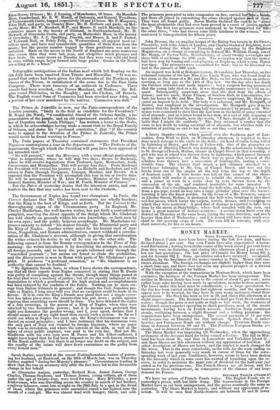The Prince de Joinsalle is now, say the Paris correspondents
of the London journals, "fairly in the field as candidate for the Presidency." M. Roger (du Nord), '" a confidential friend of the Orleans family, a re- presentative of the people, and an old experienced member of the Cham- ber of Deputies under Louis Philippe," has written a letter to the Ordre, in which he acknowledges having made a recent visit to the Royal Family of Orleans, and states his "profound conviction," that "if the country were to appeal to the devotion of the Prince de Joinville, the Prince would never be found wanting to France."
The Paris papers of Thursday contained statements that President Napoleon contemplates a tour in the departments. " The Prefects of the departments through which the President will pass have been apprised of his intended visit."
"He will proceed," said the Messeger, with a semi-official particularity, "first to Angouleme, where he will stop two days ; thence to Bordeaux, where he will receive deputations from Toulouse, Agen, Montauban, Auch, Carcassonne, and Montpellier. This will occupy four days. From Bordeaux the President will extend his journey to La Rochelle and Rochefort, and will return to Paris through Perigueux, Limoges, Moulins, and Nevers. It is expected that the. President will accomplish this tour in ten or twelve days. He will be accompanied by M. Leon Faucher, Minister of the Interior ; General Hendon, Minister of War; and M. Fould, Minister of Finance."
But the Patric of yesterday denies that the intention exists, and con- tradicts the fact that any notice has been sent to the Prefects.
The Government of Naples has found two champions. In Paris, the Univers declares that Mr. Gladstone's statements are wholly baseless ; that the King is the best of Kings, and so forth. But the ITnivers is the thoroughgoing organ of the Ultramontane party. In England, Mr. Charles Macfarlane, the well-known writer, has put forth a contradictory pamphlet, asserting the direct opposite of the things which Mr. Gladstone has told chiefly on grounds within his own knowledge, or facts seen by his own eyes ; and the public believes accordingly. Mr. Macfarlane ex- presses anxiety to defend "his dearest friends," the Ministerial party and the King of Naples. Another writer noted for his lenient view of Aus- trian, Neapolitan, and Roman administration, cannot withhold a corrobo- ration of Mr. Gladstone's account, although in giving that corroboration the writer evinces his desire to say all he can on the other side. The following extract is from the Roman correspondence in the Times of this morning : the writer introduces it by describing the attempts to exclude all foreign journals, and to keep the people informed only through the "sanctified journals" ; but means are found to elude the prohibition, and the Risorgimento is seen in Rome with parts of Mr. Gladstone's pam- phlet. It produces " a profound sensation," as " Mr. Gladstone is an authority that cannot be doubted."
"My diplomatic friends here to whom I have shown the correspondence, say that all their reports from Naples concurred in stating that M. Poerio was guilty of conspiring against the throne, though many things passed at his trial that were a mockery of justice •, but all are equally indignant at the degradation to which a gentleman of his high station and accomplishments has been reduced by the vendetta of the Police. Nothing can be more cor- rupt than Italian tribunals in general ; and though the Code Napoleon pre- vails at Naples, I long since told you that no exception could be made in its favour. It is in vain the King's friends may plead that not a single execu- tion has taken place since the insurrection was put down ; public opinion requires that something more should be done. You have defended the rights at a free sovereign, in the person of a King of Naples, when they were attacked by two formidable powers ; but it is because you protected that right you denounce the greater wrong, and I, your agent, declare that I thould sooner cut off my right hand than excuse such a system. So far as I could see when at Naples two years ago, the King's Government was con- ducted on sound principles; and I bore testimony that his dominions were the only part of Italy not violated by foreign bayonets, where no paper trash was in circulation, and where the interest of the debt, as well as the salary of every public employe, was paid to the very day. Had not Mr. Gladstone with his own eyes seen M. Poerio and his fellow-sufferers,. I might have hoped that he had been imposed on by the well-known enemies of the Royal authority : but there is no longer any doubt on the subject, and the cruelty of the crime will draw down execrations on the guilty from every honest man."


























 Previous page
Previous page